First things first: Rex Staten was a bad dude. He had a reputation as a tough competitor who never backed down. That rep was well earned, as he also spent time as a boxer and wasn’t afraid to throw a punch or two. He had a long career and was hitting the vet scene—and making money—long after his competitors had hung up their leathers.
Racer X: Rocket Rex, what’s going on?
Rex Staten: Not too much! Just sitting out here on a job site waiting for the inspector to come through and give us the green light to move forward. Today I’m working at Keiser Hospital on a build-out.
I understand you’re a plumber and a member of the union, is that correct?
Yes, that is correct. After I quit racing in 2000, I knew I had to do something, and so I started working as an electrician. That’s what my father did, but then I moved over the plumbing side of things pretty quick. Today, I’m a master plumber and pipe fitter with the Murray Company. They’re based in L.A., but we have job sites all over Southern California.
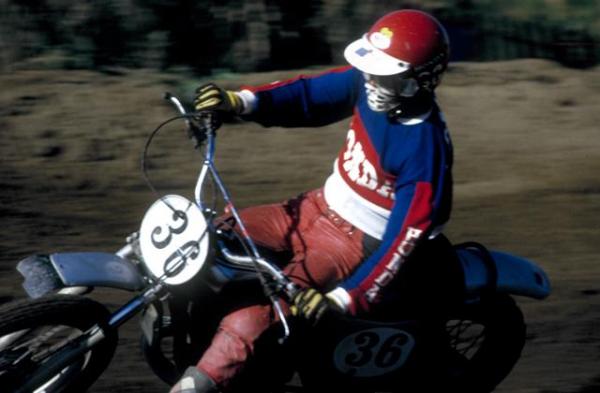
Staten had a reputation as a tough competitor who never backed down.
A friend says of all the hundreds of employees, you’re the toughest and hardest-working guy they have.
Well, I like to work circles around the kids. They can be a little lazy, sitting around with their cell phones and whatever else. I go in and get the work done—quick. Since I joined the union, they told me about the opening at Murray, and ever since then, it’s been go, go, go. I’ve been busting chops and taking names ever since!
Tell me a little bit about how you got started racing.
Well, I started when I was 13 years old. Basically, we would go out to the desert and camp as a family. My dad would go out and do all these big rides with his buddies. I started to get dialed in 1968 on an Ossa Supersport. Shortly thereafter, my dad said we should check out the races in Oak Hills at this place called The Club. He didn’t want me to race, but I convinced him to let me bring my bike I ended up winning that first race. From that day on, all I wanted to do was race.
You won your first race?
Yup. I had a bad start too! My dad, he tried to discourage me from racing, but I was relentless. I just kept riding and going. I also kept breaking the bikes. After a few years I got on a Maico, along with Gaylon Mosier and Rich Eierstedt. That was my first big ride.
Didn’t you have a factory Honda ride at one point as well?
Yes. In the early 1970s I was between Maico and CZ. Honda picked me up in ’74, which was the real early years for the CRs. Things were changing so quick. I won a moto at Daytona that year but then got in a first-turn crash in the second moto. But I was feeling good and went to Hangtown thinking I could win that first national. I won the first moto there and just beat everyone. But the second moto was the same thing, a crash in the first turn. I broke the pipe, rode to the pits, fixed it, and then started the race two laps down. I rode my ass off trying to make up time, but that didn’t work out—I was just too far behind. But man, I gave it hell that day and wanted that win.
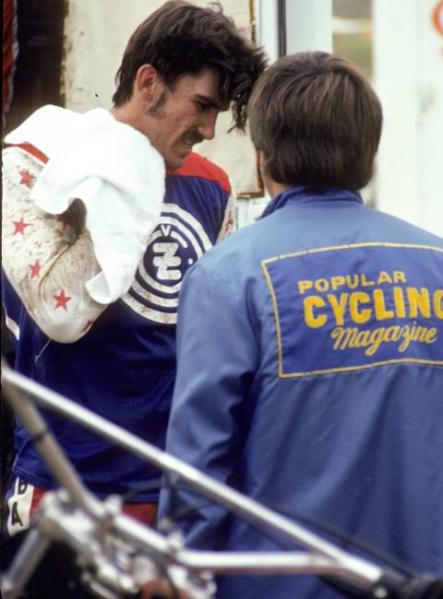
Staten spent time with factory Honda in 1974.
What was it like to ride those early factory Honda race bikes?
They were good, but like all bikes back then, they broke. Honda also built me a four-stroke factory bike but I broke that thing as well. I went to Evel Knievel’s Snake River race and finished second. But then, at the next race, which was held at Honda Hills in Ohio, I broke the frame. Steve Whitelock was my mechanic, and he told me that I should ride lighter, but I just told ’em to make better bikes.
Then in 1975 my ankles were all jacked up and I was out of a ride. I rode as a privateer on a CZ and got a few factory rides with them. That’s when Harry built that bike for the story in your magazine. But at the coliseum that year, I was leading and went off the bike and over the handlebars. That crash made ABC’s Wide World of Sports and was featured on the opening sequence for like ten years with that whole “agony of defeat” thing. But I still managed to finish seventh that night, and Jimmy Ellis got the win.
You also rode for Harley-Davidson for a few years. How did that compare to the other bikes of the time?
Harley came in 1976. I was going to sign with Yamaha that year—they had good bikes and all—but then my dad got in a fistfight with the team manager down at Corona Raceway and that didn’t happen. The team manager kept going out on the track while I was racing, and my dad kept telling him to stay off the track. He didn’t know who he was, and they came to blows over it. So no Yamaha factory ride for me. The Harleys were okay but not great. They broke as well. But then in 1978, we did get some bikes from Yamaha and I was winning the Golden States. Then we went to nationals [on Yamahas] and I got a full ride after Mike Bell got hurt. The first race on the bike, I won. That ’78 YZ was so damn good—riding it was like cheating. Yamaha then hired me for the full 1980 season. I won Daytona that year, but then [Kent] Howerton landed on my shoulder and jacked me all up. I was ready to sort him out the following weekend at New Orleans, but then I got real hurt doing some TV work for Yamaha during the week and was done for the season.
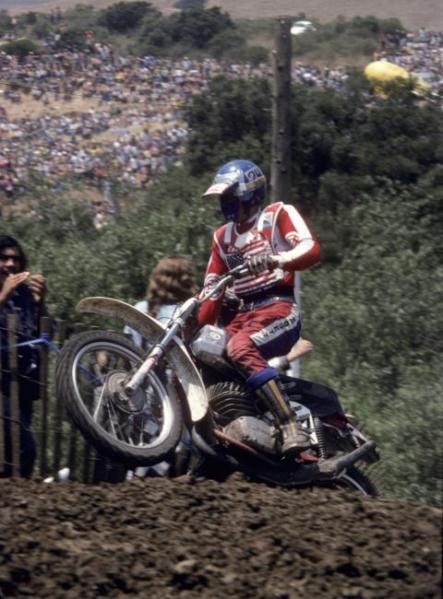
Staten not only raced in America, but Australia and South Africa towards the end of his career.
At that point, your American career was starting to fizzle, but you went on to race for a long time and earned some good money, right?
Yeah. In 1981 I got a deal in Australia to race there. Then, in 1982, I went to South Africa and raced there from 1982 through the 1985 season.
How was the money back then?
It was good, but nothing like it is today. In 1974, when I rode for Honda, I made $75,000. Back then, that was good money, as you could buy a house for $20K. I always made a few bucks, but did real good when I raced in South Africa. I had a contract for $150,000 per year plus win money that paid me $3,000 per win. By that time I was getting up there in age, so that was good money for me. But back then, there were times that I rode three classes a day—and that’s when the motos were forty minutes! But when you’re in good shape, it’s no big deal.
So you came home at the end 1985 and retired?
Well, no. I stopped for the 1986 season but then came back 1987. Broc Glover loaned me an old bike and I started riding again. I went to the Vet World Championship and won, and I starting hitting all the big vet races and good contingency races. By 1993 I was doing off-road and desert stuff with Team Green while running a little shop called Rocket Rex Racing. I did that all the way up to 2000, but then my stepson got hurt real bad while racing in the desert. I basically quit after that and decided it was time to move on. But I won my last race on one of those VOR 503s. I’ve been off the bike around eleven years now.
Wow, you had a long career! That’s pretty intense, considering you were at the very top level.
I turned pro at 16 and went until I was 46. I had over 2,000 professional wins in my career, if you can believe that. You know, I was thinking about coming back. Ronnie Lechien took me out riding not too long ago but my hip was really bothering me. If I can get that replaced, I might just come back, but we’ll see. The hip, it hurts like hell, and I don’t take no pain pills or anything—I just leave it and deal with the natural pain. Riding was too much for it, though.
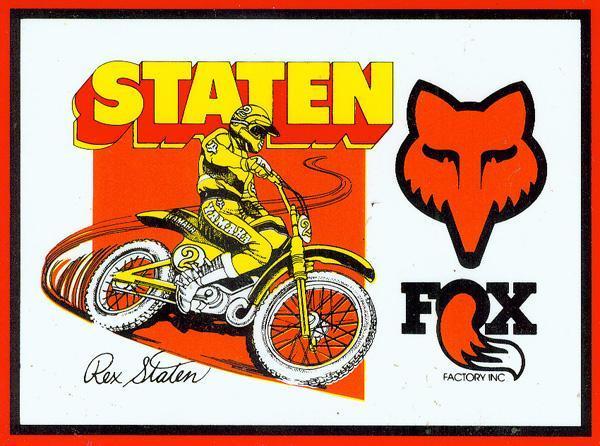
Do you still do any training to stay in shape?
For sure. I ride a mountain bike almost every night. I quit training for eleven years but recently started up again. I want to get down to 190 pounds, then I might make a sneak comeback. I’ve lost 20 pounds so far and have been doing some mountain bike racing. I gotta tell you, that stuff is absolute hell, man. Those guys can really pedal. All those little scrawny guys go buzzing past you on the hills!
Where are you living now?
Right now I have my house and shop out in Apple Valley, but when I come down to work during the week I stay in Fontana with my mom. She’s 82 and I help her out a lot around the house. Also, there’s good mountain biking in the area as well, so I can ride after work. But I drive into L.A. every day or wherever the work takes me.
What’s your opinion on racing today?
I went to Anaheim and Phoenix this year. That Stewert guy needs to think a little more and not be so berserky with his riding. I’m not sure what he’s thinking. Why would you want to come out and do a big endo when you’re leading and obviously so much faster than everyone else? One thing I have to say is that back in our day, we rode and raced everything. Back then, if they were giving away a free tire to the winner, I raced for it! The sport has changed a lot, though. Today the bikes are really good compared to what we had. But I see that a lot of the kids are spoiled. But they can make a lot of money, so that’s good for them, I guess. It seems like a lot of them want to party. I don’t drink and don’t smoke and have never touched that stuff. Kids get involved in that stuff and it goes to hell real quick.
It also seems like today kids run wild. Parents come home from work and are tired and don’t want to deal with the kid, let alone take him or her riding. And today, if you spank a kid because he was acting up, you could go to jail. When I was growing up, my dad said, “I took you into the world, and I’ll take you out.” And you know what, I was scared shitless of him. And it went both ways. My competitors were scared of me and thought I was crazy. That wasn’t the case—it was just that I was real serious, and for sure tough. If I came up to a slower rider, I would scream and yell to get out of my way, and if he didn’t, I would hit him.
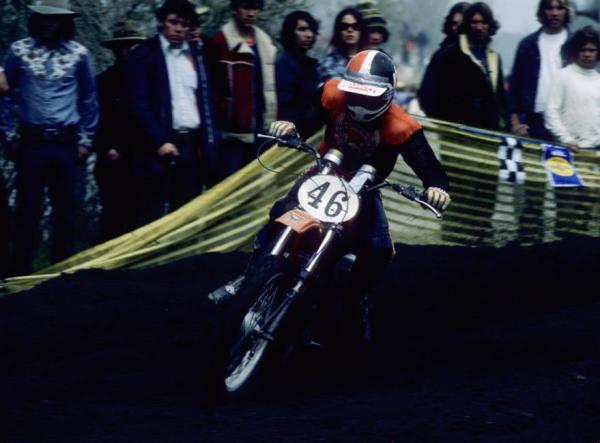
Staten is now living in Apple Valley, CA.
You raced all over the world during a time when the world was not as open as it is today. What are some of your favorite memories?
Man, I learned a lot, stuff like driving on the wrong side of the road and the metric system. In Africa, I would leave from my house down into the bush and ride. But I’ve seen it all, especially over there. The face shield, the makeup, all that stuff. Those people over there, they don’t take any shit. Also, all the bikes over in South Africa ran alcohol because of a fuel shortage. It took some serious work to get them to run right! Racing in Holland was very cool as well, as was pretty much all the European races.
Rex, thanks for your time.
Thanks. Motorcycles were good to me. I never got in trouble because of them. When I was 13, I said I would never have long hair or tattoos and that I would never drink. Even today, I have never done any of that stuff. When I won at Daytona, my hair was a little long, but that’s it. I’m older now and wouldn’t mind to do it again, but there’s no way my body could take it.




